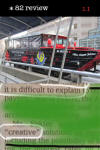Star 82 Review – March 2013
Star 82 Review puts forth its first issue, filled with sections titled “Shorts,” “Postcard Lit,” “Art Post,” “Erasure Text,” and “Hidden Gems.” I wish this magazine well, because they are already publishing great work.
Star 82 Review puts forth its first issue, filled with sections titled “Shorts,” “Postcard Lit,” “Art Post,” “Erasure Text,” and “Hidden Gems.” I wish this magazine well, because they are already publishing great work.
Alastair Johnston’s short “The Great War of 1914” opens the issue, reminding us that “memory is not to be trusted.” Later, Jane Downs tells us that “It is important to remember everything.” In Marie C. Dern’s short, the narrator prepares for press: “No type must escape, a word would be lost or part of a word. poet could become pot or pet.” Leonard Crosby tells us, “Language is how we talk back to the universe, how we express the strange beauty that is reality, and to be unaware of that, or of the universe in its ability to retort, is to dangerously ignore our most powerful and fundamentally human trait.”
Paul Hostovsky’s poem “Cleaning Out the Bank” speaks of cherishing small pleasures in life, like being able to say your job was “cleaning out the bank”:
and once I found a whole
half of a twenty dollar bill
ripped clean down the middle
which I laminated and still keep
right here in my wallet,
taking it out often as though
one could go on extracting joy
from a worthless thing
forever.
Lauren Guza Brown contributes a collection of vignettes about ethnicity in the classroom. The piece is titled “Fronteras,” which can refer both to the physical border between Mexico and the United States and to separation (of ethnicities). Written in the second-person (which was done so well that I didn’t even notice until going back and searching for quotes), the piece narrates about “you,” the teacher. In the second vignette, “you” are called to help Marcos, who has gotten his head stuck in the gate because he “wanted to see if it would fit”:
Marcos says that what he’s learned is that his head fits through one way, but not back, and this satisfies you. You can start helping him now, though you don’t know how. You were trained to keep them out of gangs, not fences. But, after a couple minutes of squeezing around the ears, Marcos realizes it’s easier for him to slide his whole body forward through the fence, where his head already is. He pushes through, takes a step on the other side, the street side, and turns back to you, jubilant. He raises his arms above his head and smiles. It’s like crossing the border, he says.
The piece brings awareness and shows small observations about the way these children view the world and how they deal with their ethnicity in school. In one case, the teacher asks Diego if when a black girl at lunch yelled “Fuck Mexicans!” it hurt his feelings; he simply replies, “No, because I’m Salvadoran.”
Also with sections that incorporate text with art, Star 82 Review publishes pieces that are not only enjoyable, but also matter.
[www.star82review.com]






